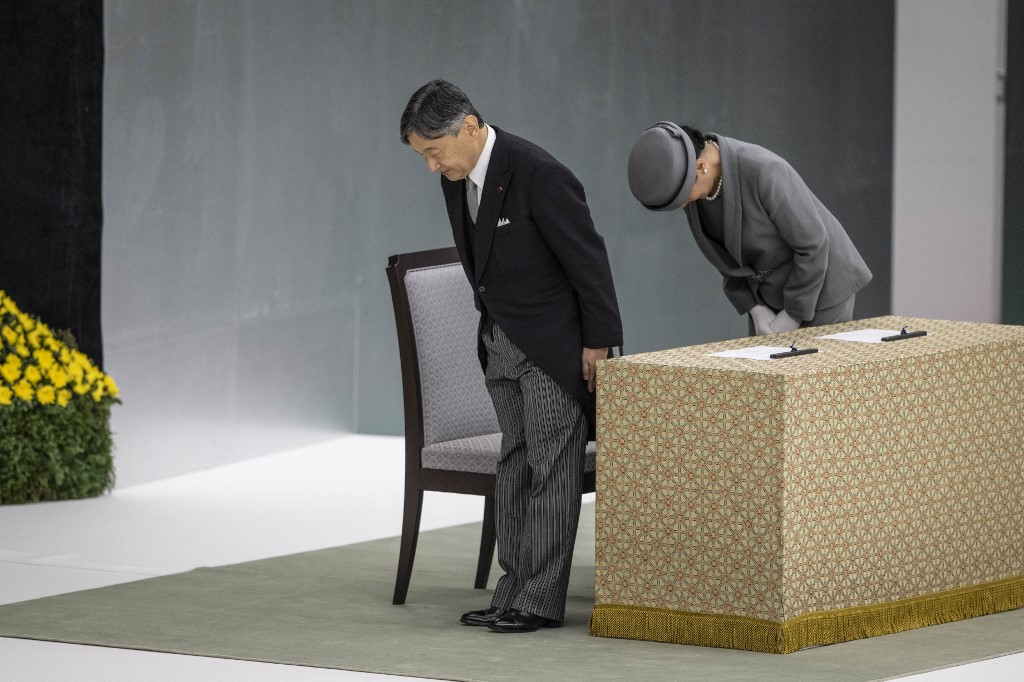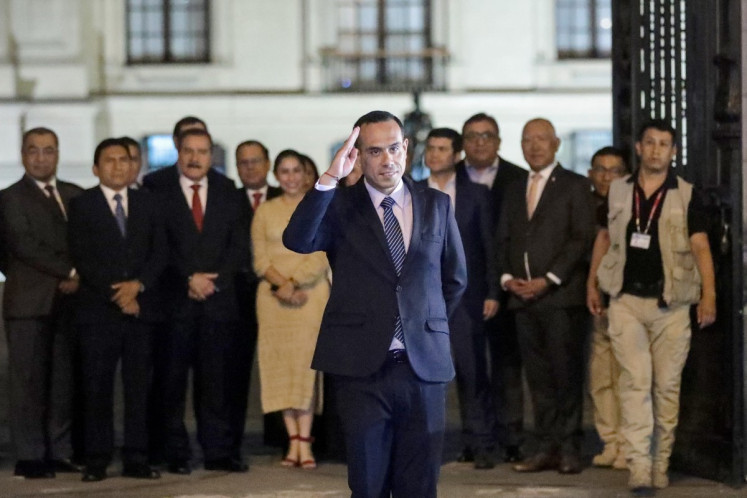Popular Reads
Top Results
Can't find what you're looking for?
View all search resultsPopular Reads
Top Results
Can't find what you're looking for?
View all search resultsJapan's emperor expresses 'deep remorse' 80 years after WWII
Naruhito said he felt "a deep and renewed sense of sorrow" in a sombre speech alongside Empress Masako in an indoor arena in the centre of the Japanese capital, where the national flag flew at half-mast outside.
Change text size
Gift Premium Articles
to Anyone
T
ens of thousands of people braved blazing heat to pay their respects at a controversial Japanese shrine on Friday, as Emperor Naruhito spoke of his "deep remorse" on the 80th anniversary of the nation's World War II surrender.
Two cabinet ministers were among the visitors to the Yasukuni Shrine in Tokyo, which honors 2.5 million mostly Japanese soldiers who perished since the late 19th century but also enshrines convicted war criminals.
Trips to the shrine by government officials have angered countries that suffered Japanese military atrocities, particularly China and South Korea.
Naruhito said he felt "a deep and renewed sense of sorrow" in a sombre speech alongside Empress Masako in an indoor arena in the centre of the Japanese capital, where the national flag flew at half-mast outside.
"My thoughts are with the numerous people who lost their precious lives in the last war and their bereaved families," the 65-year-old said.
"Reflecting on our past and bearing in mind the feelings of deep remorse, I earnestly hope that the ravages of war will never again be repeated."
Prime Minister Shigeru Ishiba also addressed the ceremony, pledging "to uphold the painful memories of war [...] passing them down across generations, and pursue actions toward lasting peace".
Ishiba, a political moderate, sent a customary offering to Yasukuni, according to Kyodo news.
No Japanese prime minister has visited the shrine since 2013, when a trip by then-premier Shinzo Abe sparked fury in Beijing and Seoul, and a rare diplomatic rebuke from close ally the United States.
China's foreign ministry said an official had made "solemn representations" with Japan's embassy in Beijing over Friday's visit, according to an online statement.
Reflection, wrongdoings
With temperatures above 30 degrees Celsius in the picturesque grounds around the shrine, there was a sea of umbrellas as people tried to shelter from the sun. At least two people became unwell in the heat and were forced to seek help.
Takashi Eguchi, a 53-year-old graphic designer from Tokyo, told AFP Yasukuni served as an accessible place in the heart of the city for ordinary people to reflect on the nation's history.
"We live in a moment when wars have broken out or are likely to break out in various places," he said. "So I came here to look back at what Japan has done, including its failures."
Another visitor, who gave only his surname Harada, came dressed in a Japanese imperial army uniform to honour the sacrifice of the war dead.
"I know the time will come when war veterans will no longer be with us. I wanted to do my part to continue their legacy," said the 39-year-old from the central prefecture of Nagano. "You have to look at all aspects of wars. Good things and bad things happened."
Agriculture minister Shinjiro Koizumi, seen as a potential future prime minister, paid a visit to the shrine in the early morning, as he does annually on Aug. 15.
He was followed later by another cabinet member, Finance Minister Katsunobu Kato.
Ishiba's chief political rival Sanae Takaichi, who leads the nationalist wing of the ruling Liberal Democratic Party, was also there, as were members of the "Japanese first" Sanseito party that made strong gains in July's upper house election with its "anti-globalist" drive.
Naruhito, Masako and their daughter Princess Aiko are due to visit Nagasaki next month to meet survivors of the devastating atomic bomb and honor the war dead in what is reportedly the emperor's first trip there since he acceded to the throne in 2019.









